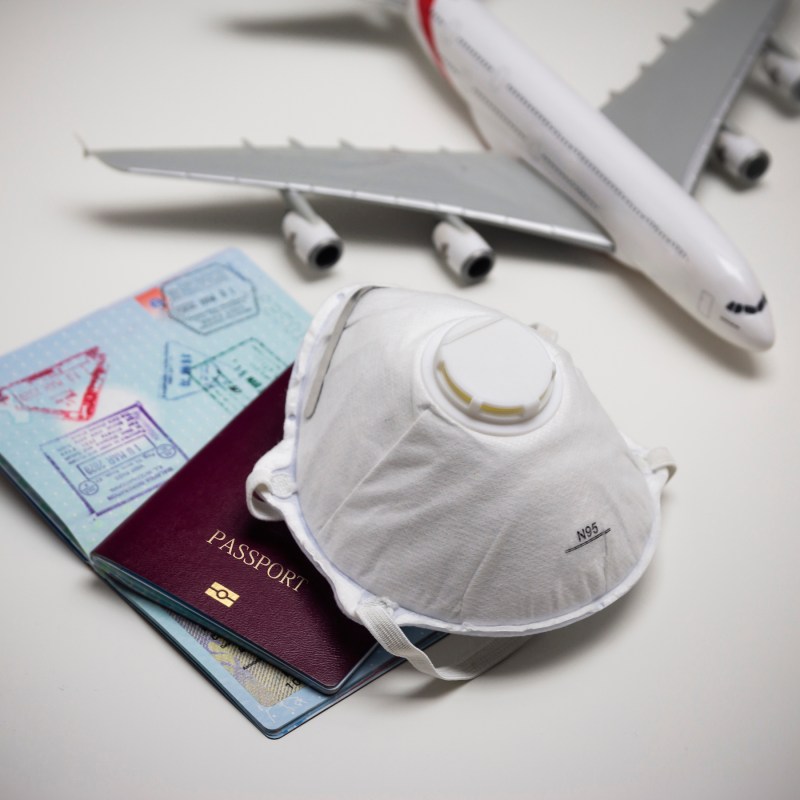
It may be somewhat difficult to travel right now, and many travel plans may have been drastically changed, but it’s still possible to go places, do things, and see attractions. Travelers, of course, are following what Prevent Epidemics calls the “3 W’s to reduce the risk of COVID-19": Wearing masks, washing their hands, and watching their distance.
To further prevent the risk of spreading COVID-19, airlines, railroad services, and car rental companies are taking new steps to make traveling safer.
Let’s take a look at these new measures.
Planes
American Airlines
American Airlines has announced it is expanding its preflight testing program for domestic travel to states and territories with COVID-19 travel restrictions.
“We’ve made great strides to help open international travel with our testing partners, and we recognize the need for similar domestic travel solutions,” said Alison Taylor, the airline’s chief customer officer. “As travel requirements continue to quickly evolve, we’re simplifying the research and COVID-19 testing fulfillment process for an overall more seamless travel experience.”
As of Wednesday, December 9, American Airlines customers traveling to any U.S. city, state, or territory that has COVID-19 travel restrictions will have access to at-home testing through LetsGetChecked (for travel scheduled for December 12 or later). The airline also said it will continue to work with LetsGetChecked to expand domestic testing as state testing requirements change.
Delta
Delta recently announced that it remains committed to providing more space for customers, and to do so, it will continue blocking middle seats for flights through March 30, 2021. The move is part of the Delta CareStandard, a set of protective measures that includes sanitizing each flight, a comprehensive employee COVID-19 testing program, and the use of industrial-grade HEPA filters that extract more than 99.99 percent of particles, including viruses, on planes.
“We recognize some customers are still learning to live with this virus and desire extra space for their peace of mind,” Bill Lentsch, Delta’s chief customer experience officer, said in a statement. “We are listening and will take the appropriate steps to ensure our customers have complete confidence in their travel with us.”
United
Finally, United Airlines announced that passengers will soon have access to virtual, on-demand customer service at the airline’s hubs. Intended as a means to give passengers an easy, contact-free option to get real-time information and support, “Agent on Demand” will provide answers to questions ranging from those about seat assignments to boarding times. Passengers will be able to access Agent on Demand on any mobile device to call, text, or video chat live with an agent.
“We know how important it is for our customers to have more options for a contactless travel experience and this tool makes it easy to quickly receive personalized support directly from a live agent at the airport while maintaining social distancing,” said Linda Jojo, United’s chief digital officer and executive vice president for technology.
Agent on Demand is currently available at Chicago O’Hare and Houston’s George Bush International Airports. It will be rolled out to United’s other hubs later this month.
Trains
Amtrak
The Amtrak app already allows users to receive gate and track information, which reduces crowds at departure boards. Customers can also book, board, check train status, and access information from their mobile device. Furthermore, Amtrak encourages boarding with eTickets, which conductors scan from the Amtrak app.
In its next step, Amtrak announced Apple Pay, Google Pay, and PayPal are now available when checking out on the Amtrak mobile app and website.
Once logged in, customers can save their preferred digital payment method as a default payment option in their profile, Amtrak explains. “For each of the three new payment methods,” the announcement notes, “customers can purchase tickets and modify reservations originally paid with one of the digital payment solutions.
“We know every minute counts for our customers and now purchasing tickets is as simple as the touch of a button,” said Roger Harris, the railroad service’s executive vice president said.
Automobiles
In a survey of car rental firms last summer, Discover Cars found that more than three quarters of the rental firms surveyed said that they “carry out specialist sanitation on each of their cars across all locations” to protect customers. Furthermore, 60 percent of the companies said they provide antibacterial gel, 46 percent said they provide customers with a mask, and 17 percent said they provide customers with antibacterial wipes.
Enterprise
Enterprise has now gone a step further, formalizing the step of putting a disinfecting wipe in each rental vehicle. The step corresponds with its new initiative with Clorox to implement near- and long-term enhancements to its cleaning procedures.
To kick off the initiative, Enterprise Holdings announced it will provide a one-count Clorox disinfecting wipe in every vehicle rented through its brands — Enterprise Rent-A-Car, National Car Rental, and Alamo Rent-A-Car. The effort has already begun throughout the southeast U.S. Next year, the company will expand the practice to locations throughout the rest of the U.S. and Canada, as well as to the Enterprise Truck Rental and Enterprise Car Sales businesses.
“This is a simple but first-of-its-kind effort in the car rental industry, and it’s our way of increasing customers’ peace of mind,” said Will Withington, senior vice president of North American operations for Enterprise Holdings. “We heard this loud and clear from car rental customers — they want more personal cleaning control, in addition to our already rigorous cleaning and sanitizing procedures that follow each rental. In fact, nearly 80 percent of those we surveyed said they would feel most comfortable renting if they were to receive a disinfecting wipe to wipe down high-touch areas themselves.”
Ships
Princess Cruises
Finally, although cruises in U.S. waters are now paused, cruise lines are at work developing initiatives to improve guest safety once cruises resume. For example, Princess Cruises has announced it is expanding its “Book with Confidence” policy, which will allow guests to change their vacation plans 30 days prior to their day of departure, then receive cancellation fees as a future cruise credit.
“We’re all dreaming about our next cruise vacation and experiencing the wonder of new places, people, and cultures,” said Deanna Austin, chief commercial officer of Princess Cruises. “When we set sail again, our guests can feel at ease with the promise of a great cruise vacation, and the flexibility of adjusting their bookings if their plans change.”
Whether your travel is by plane, train, automobile, or even a future cruise, these changes will help to make that travel safer.
Further Reading:
- Stuck At Home? Here’s How To Take A Virtual Vacation
- Edinburgh To London: How My First COVID-Era Flight Went
- How Airports In The U.S. Are Preparing For The Holidays
For more COVID-related travel news, you can read the latest here.
